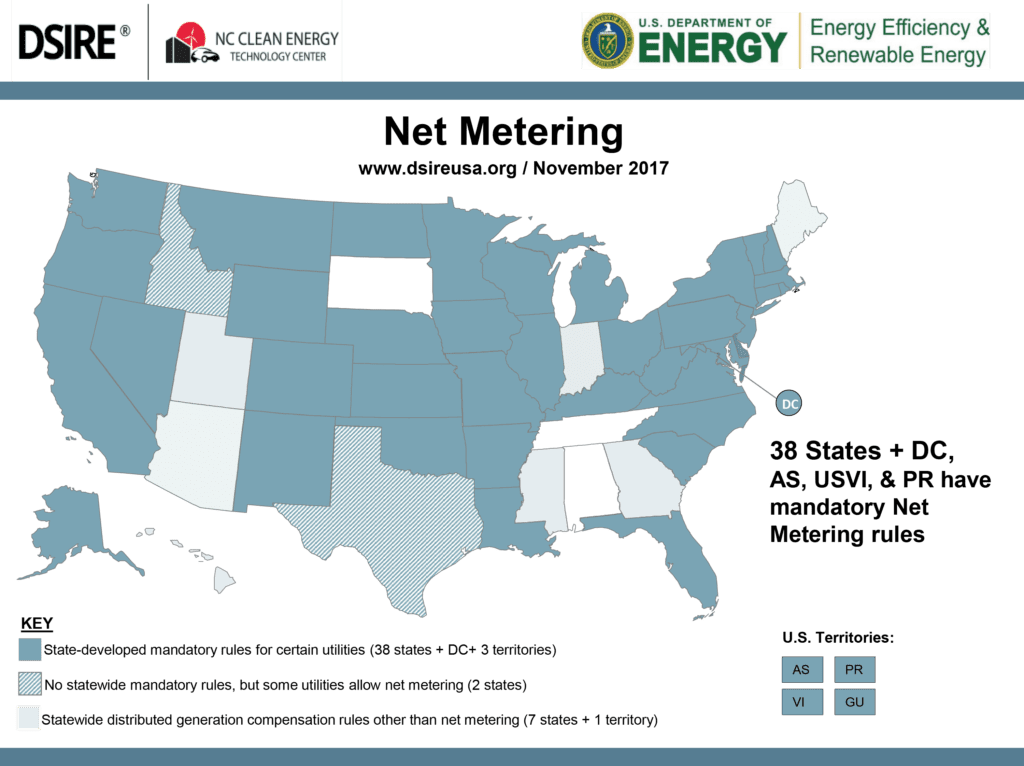Can rooftop solar and net metering really free you from high electric bills? In areas where net metering is available, the answer is yes. Net metering is a process that slows your electric meter down or even spins it backwards when your solar power system generates excess power. A typical home solar power system generates more power than a home uses during the day. Under net metering schemes, that excess electricity is fed into the grid. The homeowner is then given credit for the value of that power. That credit will either reduce future bills or be paid directly to the homeowner.
Get the FAQ’s of going solar with Freedom Forever
What you need to know: Net metering isn’t offered in all states or utility service areas. You should check with your local electric utility to see what programs they offer for home solar power systems.
What is net metering?
Net metering credits solar power system owners for the electricity they supply to the grid. Naturally, a rooftop solar power system doesn’t provide power at night, so the system owner gets electricity from the grid at night. The idea behind net metering is for the customer’s system to produce enough electricity during the day to cover the cost of the electricity used at night. The customer then pays the net difference between the amount of power they used and the power they generated. The goal of net metering is to produce as much power as you consume, or more. That can either reduce or eliminate your electric bill. If you supply more power than you use, you get a bill credit for the excess. On average, only 20% – 40% of the power produced by a home rooftop solar power system is fed back into the grid.
(source: https://www.seia.org/initiatives/net-metering)
Where is net metering available?
Net metering is available in 38 states, plus American Samoa, Puerto Rico, and the Virgin Islands.

States where net metering is available. (Map courtesy of the US Department of Energy
As you can see from the map above, most states offer net metering. Even in those states that don’t offer it, there is some form of alternative plan to compensate solar power system owners for the power their system provides to the grid.
Why net metering reduces or eliminates your electric bill
A professional solar installer such as Freedom ForeverTM can design your solar power system to produce roughly 115% of your household’s annual electrical consumption. Your solar power system naturally produces more power in the summer than it does in the winter. Because of that seasonal variation in power production, you can expect to produce more power than you need during the summer. Likewise, during the winter you will likely use more power than your system produces.
During months that your system produces more power than you consume, you will earn bill credits with your electric utility that “rollover” into later months. You accumulate credits during the spring and summer. Those credits are then gradually used to pay for the energy you use during the fall and winter. If you have any excess bill credits left over at the end of the year, the power company will send you a check for the amount of those credits. Thus, the goal is to try and eliminate your electric bill.
The only way net metering can fail
Home solar power systems are reliable, and they need very little maintenance. But solar power systems aren’t perfect, they can stop generating power. If you don’t continuously monitor your system, it could stop producing power, and you wouldn’t know about it until you receive an unexpectedly large electric bill. Should that happen, you’d lose out on the power your system would have produced while it was down. Unless you own a Freedom Forever™ solar power system…
The Freedom Forever™ 25-year performance guarantee
Freedom Forever guarantees that if your system stops producing power, and it’s our fault, it’s on us. We will pay you for the amount of guaranteed power you lost while your system was down. The amount of compensation you will receive will be agreed to in your contract with us. Additionally, we monitor your system for you, so you don’t have to watch it. Other companies don’t monitor your system, and certainly, don’t make our guarantee. If you get that nightmare bill on their watch, well, it’s your problem, not theirs.
